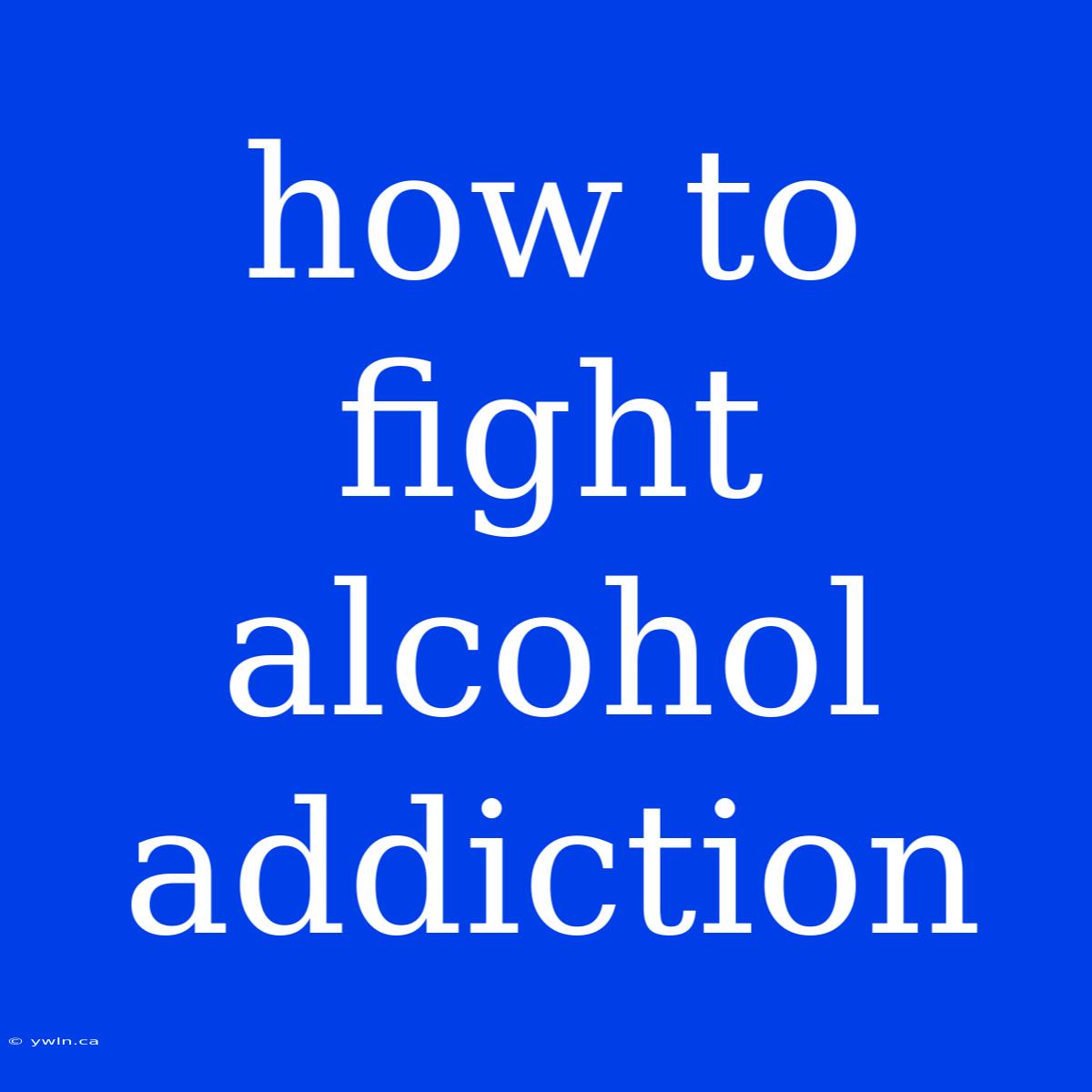Unveiling the Path to Sobriety: A Comprehensive Guide to Fighting Alcohol Addiction
Is alcohol addiction a struggle you or someone you love is facing? Alcohol addiction can feel like an insurmountable obstacle, but there is hope. It's important to understand that fighting alcohol addiction is a journey, not a destination. This comprehensive guide provides insights into the complexities of alcohol addiction and outlines actionable steps towards recovery.
Editor Note: This guide explores the multifaceted nature of alcohol addiction, offering a roadmap for those seeking recovery. It's a valuable resource for individuals battling addiction, their families, and anyone interested in understanding the intricacies of this complex condition.
Analysis: We have diligently researched and analyzed various resources, including clinical studies, expert opinions, and recovery programs, to compile this guide. It delves into the mechanisms of addiction, explores effective treatment options, and provides practical advice for supporting someone in recovery.
Key Takeaways:
| Takeaway | Description |
|---|---|
| Alcohol addiction is a chronic disease. | It's not a sign of weakness, but a condition that requires professional support and lifestyle changes. |
| Recovery is possible. | With proper treatment and support, individuals can achieve lasting sobriety. |
| There are various treatment options available. | From therapy to medication, personalized approaches can help address individual needs. |
| Support groups and family involvement are crucial. | Building a strong support network is essential for long-term success. |
Understanding Alcohol Addiction
Alcohol addiction, also known as alcohol use disorder, is a complex condition characterized by an uncontrollable urge to consume alcohol despite its harmful consequences.
Key Aspects:
- Physiological Dependence: The body adapts to alcohol's presence, leading to withdrawal symptoms when consumption stops.
- Psychological Dependence: Alcohol becomes a coping mechanism for stress, anxiety, and other emotional challenges.
- Tolerance: The body requires increasing amounts of alcohol to achieve the desired effects.
- Withdrawal: Abruptly stopping alcohol consumption can lead to severe physical and psychological symptoms.
The Impact of Alcohol Addiction
Alcohol addiction significantly affects individuals, their families, and society.
Key Aspects:
- Health Risks: Alcohol addiction can lead to liver disease, heart problems, and increased risk of various cancers.
- Social Consequences: Relationships, work, and social life can be severely disrupted.
- Financial Strain: Excessive alcohol consumption can lead to financial difficulties.
- Legal Issues: Driving under the influence or alcohol-related offenses can have legal repercussions.
Pathways to Recovery
Treatment Options:
- Detoxification: Supervised medical withdrawal from alcohol.
- Therapy: Cognitive-behavioral therapy (CBT), motivational interviewing, and group therapy can help address the underlying causes of addiction and develop coping skills.
- Medication: Certain medications can reduce cravings and withdrawal symptoms.
- Support Groups: Alcoholics Anonymous (AA) and other support groups provide a safe and supportive environment for individuals in recovery.
Supporting Someone in Recovery
Key Aspects:
- Empathy and Understanding: Avoid judgment and offer support without enabling unhealthy behaviors.
- Open Communication: Encourage honest conversations about their struggles and progress.
- Respecting Boundaries: Recognize their need for space and allow them to take control of their recovery.
- Seek Professional Help: Encourage them to seek professional treatment and support.
FAQs about Fighting Alcohol Addiction
- How can I tell if someone is struggling with alcohol addiction? Look for changes in behavior, such as neglecting responsibilities, hiding alcohol use, or experiencing withdrawal symptoms.
- What are the long-term effects of alcohol addiction? Long-term consequences can include physical health issues, mental health problems, and relationship breakdowns.
- Is alcohol addiction treatable? Yes, with proper treatment and support, recovery is possible.
- How can I help someone struggling with alcohol addiction? Offer empathy, support, and encourage professional help.
- What are some common misconceptions about alcohol addiction? People often mistakenly believe it is a sign of weakness or a personal failing.
- Where can I find resources for fighting alcohol addiction? Contact local treatment centers, support groups, or mental health professionals for guidance.
Tips for Fighting Alcohol Addiction
- Seek Professional Help: Reach out to a qualified therapist or addiction specialist.
- Attend Support Groups: Join Alcoholics Anonymous or other support groups to connect with others in recovery.
- Build a Strong Support System: Surround yourself with supportive family, friends, and mentors.
- Identify Triggers: Understand what situations or emotions tend to lead to alcohol use.
- Develop Healthy Coping Mechanisms: Engage in activities that bring you joy and help you manage stress, such as exercise, hobbies, and meditation.
- Practice Self-Care: Prioritize your well-being through healthy eating, adequate sleep, and relaxation techniques.
Conquering Alcohol Addiction: A Journey of Hope
Fighting alcohol addiction is a journey that requires commitment, courage, and support. While the path may be challenging, recovery is possible. Embrace resources, connect with others in recovery, and find the strength within yourself to create a healthier and happier life. Remember, you are not alone, and there is hope for a fulfilling future free from the grip of alcohol addiction.

